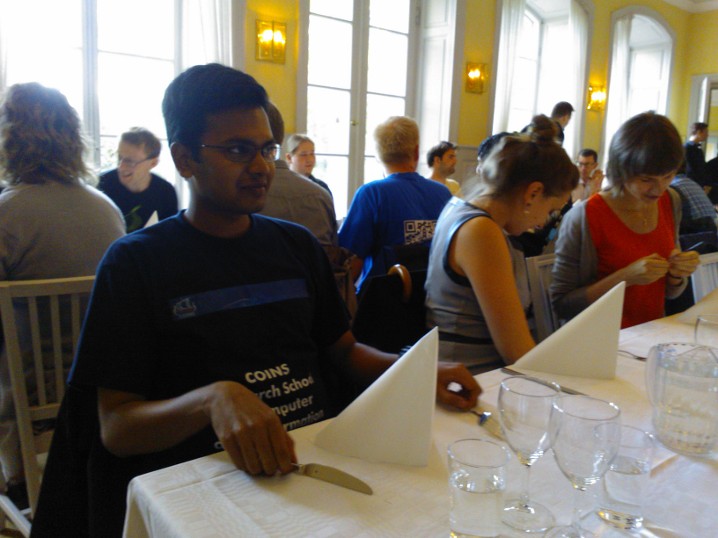Pankaj Shivdayal Wasnik successfully completed his PhD trial lecture and thesis defense at the Norwegian University of Science and Technology on Wednesday, the 8th of May 2019 and will be awarded the degree of Doctor of Philosophy in Computer Science.
The title of his thesis is “Robust Biometrics on Smartphones – Using Quality Assessment, Presentation Attack Detection, and Biometric Fusion” and the given topic for his trial lecture was “Blockchain technology, algorithms and benefits in Healthcare”.
With the technological advancements in mobile technology, there is a massive
adoption of biometrics as a security measure in today1s smartphones. Smartphones
are used in all day to day activities such as online banking, accessing
official and personal emails, social networking and also to store personal
data. Although smartphones provide high user convenience, there is
an inherent security threat as losing such a device could lead to a loss of
such sensitive data. This could cause disastrous effects on the smartphone
user. In order to reduce the privacy and security threats, basic solutions
are provided with every smartphone. However such solutions could cause
user inconvenience sometimes, for example, it is hard to remember complex
lock patterns, longer pin codes; also such patterns and pins could be easily
hacked. Thus, an inherent need of added security measure is there and
which could be conveniently fulfilled by biometrics on smartphones. As a
result of which, recently, most of the smartphones are manufactured with
inbuilt fingerprint sensor, or state-of-the-art face or iris recognition system.
Today, we can say that for any smartphone, a biometric system is one
of an essential component just like the front and rear cameras. However,
the inclusion of such a biometric system comes with a cost such as the
performance of a biometric system is depends on several factors such as the
input sample quality, systematic and random errors. Moreover, biometric
systems are highly vulnerable to direct and indirect attacks. The direct
attacks aka presentation attacks are carried out at the biometric sensor
level by presenting a fake biometric sample. If a biometric system does not
have an attack detection module also know as presentation attack detection
module, it is trivial to spoof any biometric system.
Thus, the primary objectives of this thesis are to address the challenges
of smartphone biometrics. The unconstrained nature biometric sample capture
in a smartphone environment could cause challenging input samples for
the recognition system and results in a lower comparison score. Therefore,
it is essential to assess the precise quality if the input samples. In this work,
we present and compare several quality assessment algorithms to formulate
a unified face recognition system. This thesis proposes two presentation attack
detection techniques for smartphone-based face recognition system and
one for fingerphoto recognition system. The thesis also extends the applications
of some concepts from Subjective Logic to fuse the comparison scores
from face and fingerprint recognition system. Additionally, this thesis proposes
a multi-biometric and multi-algorithmic fusion scheme to mitigate the
effects of body weight variations for face recognition systems. Although the
proposed framework does not use smartphone biometric data, the method
could be easily adapted for the smartphone-based face recognition.
The validity of proposed frameworks for consistent performance is demonstrated
through extensive experimentation on publicly available and newly
created databases. We have also presented a new smartphone based multimodal
biometric database as well as presentation attack database in this
work. Conclusively, the thesis proposes a robust Biometric Quality Assessment
(BQA), Presentation Attack Detection (PAD) and Biometric Fusion
techniques to address the issue of sample quality assessment, presentation
attacks, and multi-modal biometric fusion. A detailed experimental analysis
and comprehensive studies has been executed to evaluate the proposed
methods under the scope of this thesis work. The presented methods will
help the researchers and users of smartphone biometrics to improve the
robustness of the system.
The following committee has been appointed to evaluate his thesis, trial lecture and defense:
- First external opponent: Associate Professor Maria De Marsico, Department of Computer Science, Sapienza University of Rome, Italy.
- Second external opponent: Professor Martin Drahanský, Department of Intelligent Systems, Brno University of Technology, Czech Republic.
- Internal member and committee administrator: Associate Professor Sule Yildirim Yayilgan, Department of Information Security and Communication Technology, NTNU.
Pankaj Shivdayal Wasnik carried out his PhD work at the Department of Information Security and Communication Technology, NTNU in Gjøvik.
His main supervisor was Professor Raghavendra Ramachandra, Department of Information Security and Communication Technology, NTNU and co-supervisor Professor Christoph Busch, Department of Information Security and Communication Technology, NTNU.
Congratulations!

